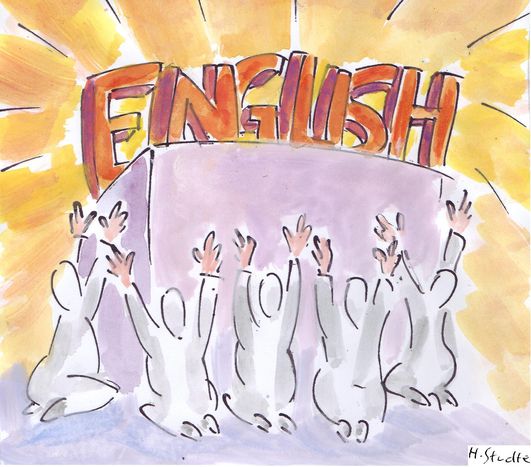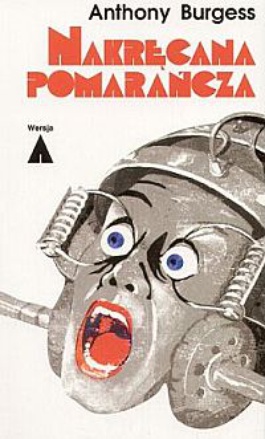
Portmanteau words: Denglisch in Europe
Published on
Translation by:
Cafebabel ENG (NS)Europe’s hybrid languages are little spoken of though oft spoken. Trend tour of continental mouths, including Franglais, Spanglish, Italenglish, Ponglish, and so on, and so forth
The German press is obsessed with the English word bashing at the moment. From Unscrupulous Islam-Bashing! (Presse) to The End of Google Street View Bashing! (ZDF) or Bashing Against Boateng! (Süddeutschen) or the political class which is getting a right royal Sarrazin Bashing! (Berliner Umschau), the trend is obvious for all to see. The media-friendly bashing is an economic word for the Germans (it’s otherwise translated to the longer phrases ‘an den Pranger stellen’ and ‘öffentlich Kritik üben/ beschimpfen’). Like many other anglicisms, it’s found its way into the German language, who used to go Public Viewing to watch the 2010 world cup, or canceln flights, recyceln like maniac, wear Make-Up and use Online-Banking. Denglisch, the portmanteau word created out of Deutsch and Englisch, has essentially become the mainstream.
Taubon law or nothing in France
The Germans aren’t fighting a lone battle against this linguistic mutation. Across the Rhine, the French have already been fighting the invasion of franglais (a mix of français and anglais) for some time now. The neologism was created by grammarian Max Rat and appeared in the columns of the French daily France-Soir in 1960.The hexagonal desire to protect their language first cropped up in 1994 with the Toubon law, named after the-then right-wing culture minister Jacques. Consequently, the French remue-méninges instead of brainstorming, and send courriels as opposed to emails. The law has been nicknamed the 'All Good Law', as Toubon sounds like 'tout bon'.
 The phenomenon has travelled east too – in the Czech Republic, Hungary, the three Baltic states as well as in Poland, where a party is called an eventy and where mejlować (pronounced ‘mailovatch’) means to send an e-mail. The British media started waxing lyrical about Ponglish in the summer of 2008. The concept is also being promoted by the authorities down south in Italy, who circulated flyers encouraging teachers, artists and politicians to start speaking Italenglish – in vain. That romantic phrase Ti amo (I love you) has progressively (or regressively) slipped off the tongue to become ti lovvo (from the verb lovvare…evidently). Russians use Ruglish to call their girls chicksas (chicks), which also times in well with the universal acceptance of chicas to refer to girls. Spanglish is a more recognisable term today thanks to its use in the 2004 James Brooks movie Spanglish, featuring Andalucian actress Paz Vega’s Hollywood debut.
The phenomenon has travelled east too – in the Czech Republic, Hungary, the three Baltic states as well as in Poland, where a party is called an eventy and where mejlować (pronounced ‘mailovatch’) means to send an e-mail. The British media started waxing lyrical about Ponglish in the summer of 2008. The concept is also being promoted by the authorities down south in Italy, who circulated flyers encouraging teachers, artists and politicians to start speaking Italenglish – in vain. That romantic phrase Ti amo (I love you) has progressively (or regressively) slipped off the tongue to become ti lovvo (from the verb lovvare…evidently). Russians use Ruglish to call their girls chicksas (chicks), which also times in well with the universal acceptance of chicas to refer to girls. Spanglish is a more recognisable term today thanks to its use in the 2004 James Brooks movie Spanglish, featuring Andalucian actress Paz Vega’s Hollywood debut.
Get your Smokings on
The Germans aren’t really reacting well to the deluge of anglicisms. Remember what, exactly a year ago today, foreign minister Guido Westerwelle told a BBC reporter about speaking in English whilst in Germany? Despite everything, organisations such as the Aktion Lebendiges Deutsch ('Vivid German Action') at the Stiftung deutsche Sprache (‘German language foundation’) are passing the offensive whilst the big papers, headlines and press releases are re-Germanising…
'Many Germans aren’t actually fleeing from their language, but from their skins'
So why do Germans have such difficulties throwing themselves into the mix? ‘Many Germans aren’t actually fleeing from their language, but from their skins as Germans – it’s better to be half an American than to be a nazi 100%. Essentially people want to be on loan to the goodies side, those who always win in Hollywood films, according to a blogpost by professor Walter Krämer from Dortmund university. Eat that! Call it a simplist point of view, but professor Krämer seems to have a point – Germans are the masters of Denglisch. They use beamers for projectors, drive oldtimers (old cars) and wear Smokings (tuxedos). Funnily enough, these words might not mean anything to the Brits, who’d presume that beamers, oldtimers and smokings might be related to Star Wars, pensioners and ashtrays. When will the time be ripe for a bit of Denglisch bashing?
Illustration: ©Henning Studte/ videos: Les Inconnus (cc) glook183/ Youtube
Translated from Kontinentales (D)Englisch-Bashing



